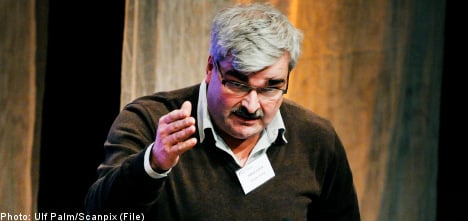One of Sweden’s most closely-watched and drawn out political dramas came to apparent close on Thursday when the Social Democratic party’s nomination committee announced Håkan Juholt as its unanimous choice to succeed Mona Sahlin as party leader.
As a member of parliament since 1994 and chair of the Riksdag’s Committee on Defence, Juholt is hardly a complete unknown. But his name was not among those often bandied about in the press and in party circles as a front-runner for the party’s top job.
“Juholt sailed up into the pole position out of nowhere,” political science professor Nicholas Aylott from Södertörn University tells The Local.
“Nevertheless, he has some credentials that would make him a good leader.”
As chair of the Social Democrat party in Kalmar County in southern Sweden, he has a strong base of support within the party apparatus.
According to Aylott, Juholt is also something of a “pragmatist” who is willing to work across party lines to find solutions.
“His biggest advantage may be that the left appear to have gathered behind him without him being someone who has openly been allied with the left wing of the party,” says Aylott.
“He’s not going to be held hostage by the left and certainly doesn’t appear that he’s planning to pull the party to the left.”
Aylott cautions, however, that it’s “too early to tell” where Juholt may take the Social Democrats, a party which Aylott said “needs to have a big discussion with itself” about whether it wants to head toward the centre or more to the left.
Shortly after the announcement of Juholt’s candidacy, union leader Stefan Löfven, head of IF-Metall, who himself figured in early speculation to become the Social Democrats’ new leader, expressed his support for the nomination.
“Håkan is a powerful debater with a clear ideological profile,” he wrote in a statement.
“Håkan is a pragmatist and understands that the connection between the manufacturing and service sectors is a condition for a strong welfare state.”
Speaking with the TT news agency, Stig-Björn Ljunggren, a political scientist with close ties to the party, also criticised the selection process, which set different factions within the party against one another.
“I’m a little surprised at Juholt’s name, but less surprised than I would have been two weeks ago considering the catastrophe the party found itself in,” he says.
He claims that “everyone is fighting against everyone” within the Social Democrats.
“And if the party can’t succeed in choosing a new leader under current procedures, how in the hell can they find a policy line that is credible?” he asks.
According to political scientist Ulf Bjereld, the naming of Juholt represents a victory for the Social Democrats’ process of renewal.
“It’s a victory for those who are striving for renewal in the party and for those who blocked (Mikael) Damberg,” he tells TT.
“Juholt isn’t a part of the old leadership, and therefore has less of a heavy burden to bear. I think it’s brave of the nomination committee because he hasn’t been a minister and is a little of an untested entity.”
He describes Juholt as “slightly left”, an assessment which Juholt himself mirrors on his own website, with a strong personality, and someone who is a good communicator and can make inspiring speeches.
“You can almost consider him a wild card, given that he hasn’t been an obvious name at all. But he’s a little different compared to the Social Democratic party culture. He’s a bit bold, dares to stick out and is rather outspoken,” Stockholm university political science professor Jenny Madestam tells TT.
Born in 1962, Juholt has made a name for himself on defence issues, having led the Riksdag’s Advisory Council on Foreign Affairs from 2000 to 2007. He also served as an advisor with the defence ministry and is currently chair of the Riksdag’s Committee on Defence.
Between 1984 and 1990, Juholt was a member of the board of the Social Democrats youth organisation SSU, entering the Riksdag in 1994 as a representative from Kalmar County in southern Sweden.
He also served as a delegate to the parliamentary assemblies of both Nato and the Organisation for Security and Cooperation in Europe (OSCE) in 1995 and 1996.
In 2004, he was named the Social Democrats’ deputy party secretary and held the party secretary position briefly following the departure of Marita Ulvskog before Ibrahim Baylan took over the job.
Despite his long history within the party and strong base of support, Aylott warned that the way in which he was chosen may ultimately handicap his ability to take the party forward.
“He’s going to have the same problems that Sahlin had because of the way he was chosen,” he says.
“This party has really big problems and needs to decide internally if it wants to go to the centre, in the spirit of Tony Blair, or if there is another model based on its roots in the labour movement.”
By foregoing an open competition and debate about Sahlin’s successor, the party missed a chance to bring clarity to the issue, according to Aylott.
“If no real mandate is there, that makes it tough to maneuver afterwards,” he says.
“I don’t think the party has come to a collective decision on what to do, something which could have perhaps been accomplished if the leadership selection process had been an open competition.”
Outside of politics, Juholt was a journalist and photographer with several newspapers in the southern Sweden before entering the Riksdag.
An avid music fan, Juholt lists Elvis Presley, Johnny Cash, Bob Dylan, Leonard Cohen, Ulf Lundell, Frank Sinatra and Bruce Springsteen among his favourite artists.



 Please whitelist us to continue reading.
Please whitelist us to continue reading.
Member comments